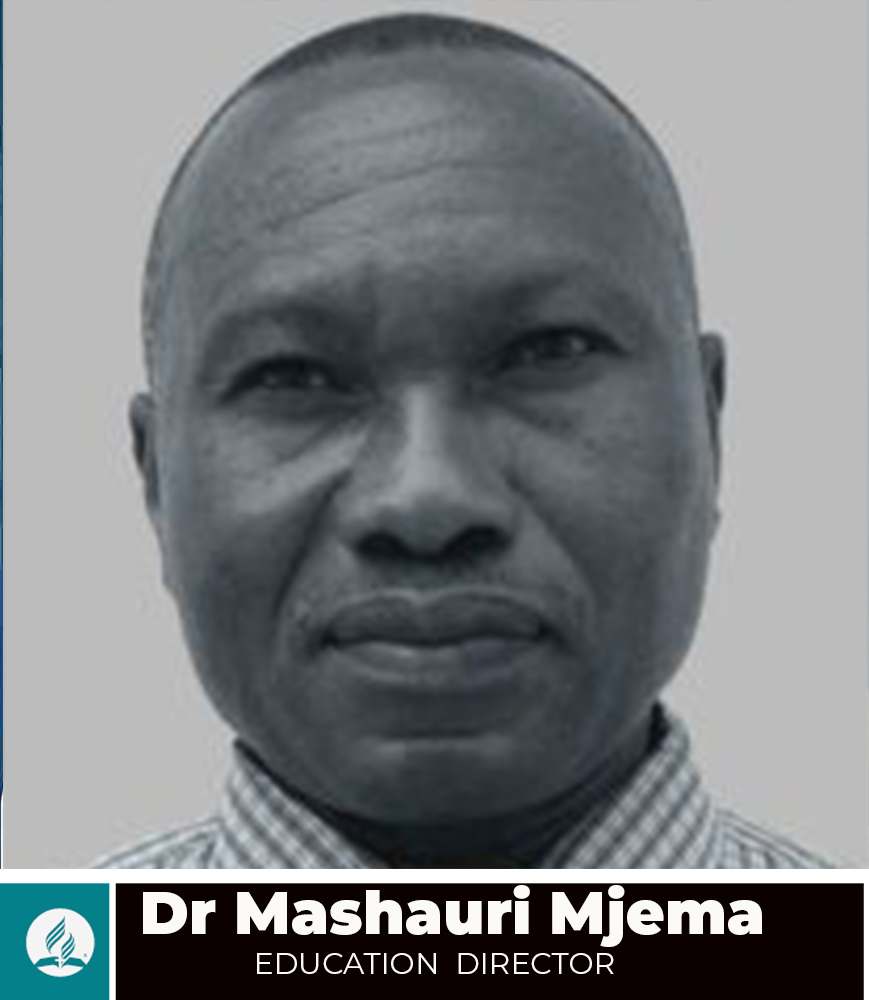

The Education Department is responsible for the supervision, coordination, promotion and quality control of the global Seventh-day Adventist educational system. working through such administrative authority as is delegated by the various organizational levels of the world Church.
Dr Mashauri Mjema-Education Director NTUC

AIM AND MISSION
Adventist education prepares people for useful and joy-filled lives, fostering friendships with God, whole-person development, Bible-based values, and selfless service in accordance with the Seventh-day Adventist mission to the world
PREMISES
Seventh-day Adventists, within the context of their basic beliefs, acknowledge that:
1. God is the Creator and Sustainer of the entire universe animate and inanimate.
2. God created perfect human beings in His own image with power to think, to choose, and to do.
3. God is the source of all that is true, good, and beautiful, and has chosen to reveal Himself to humankind.
4. Humans, by their own choice, rebelled against God and fell into a state of sin that has separated them from God and each other, affecting the entire planet and plunging it into the cosmic conflict between good and evil. In spite of this, the world and human beings still reveal, albeit dimly, the goodness and beauty of their original condition.
5. The Godhead met the problem of sin through the plan of redemption. This plan aims to restore human beings to God’s image and the universe back to its original state of perfection, love, and harmony.
6. God invites us to choose His plan of restoration and to relate to this world creatively and responsibly until He intervenes in history to bring forth the new heavens and the new earth that is promised in His Word.
ally, and socially. Its time dimensions span eternity. It seeks to develop a life of faith in God and respect for the dignity of all human beings; to build character akin to that of the Creator, to nurture thinkers rather than mere reflectors of others’ thoughts; to promote loving service rather than selfish ambition; to ensure maximum development of each individual’s potential; and to embrace all that is true, good, and beautiful.
PHILOSOPHY OF EDUCATION
The Seventh-day Adventist philosophy of education is Christ-centered. Adventists believe that, under the guidance of the Holy Spirit, God’s character and purposes can be understood as revealed in the Bible, in Jesus Christ, and in nature. The distinctive characteristics of Adventist education derived from the Bible and the writings of Ellen G White point to the redemptive aim of true education: to restore human beings into the image of their Maker.
Seventh-day Adventists believe that God is infinitely loving, wise, and powerful. He relates to human beings on a personal level, presenting His character as the ultimate norm for human conduct and His grace as the means of restoration.
Adventists recognize that human motives, thinking, and behavior have fallen short of God’s ideal. Education, in its broadest sense, is a means of restoring human beings to their original relationship with God. Working together, homes, schools, and churches cooperate with divine agencies in preparing learners for responsible citizenship in this world and in the world-to-come. Adventist education imparts more than academic knowledge.
It fosters a balanced development of the whole person spiritually, intellectually, physic
AGENCIES OF EDUCATION
1. Home
The home is society’s primary and most basic educational agency. Parents are the first and most influential teachers and have the responsibility to reflect God’s character to their children. Moreover, the whole familial setting shapes the values, attitudes, and world view of the young. The church and the school, along with society’s other educational agencies, build on and supplement the work of the home. Effective educational work requires collaboration among the home, church, and school.
2. Local Church
The local church also has a major assignment in the lifelong educational enterprise. The congregation as a community of faith provides an atmosphere of acceptance and love in which it disciples those within its sphere of influence in a personal faith in Jesus Christ and in a growing understanding of the Word of God. This understanding includes both an intellectual aspect and a life in harmony with God’s will.
3. School, College, and University
All levels of Adventist schooling build on the foundation laid by the home and church. The Christian teacher functions in the classroom as God’s minister in the plan of redemption. The greatest need of students is to accept Jesus Christ as their personal Savior and commit to a life of Christian values and service. The formal and informal curricula help students reach their potential for spiritual, mental, physical, social, and vocational development. Preparing students for a life of service to their family, church, and the larger community is a primary aim of the school. “These schools were intended to serve as a barrier against the wide-spreading corruption, to provide for the mental and spiritual welfare of the youth, and to promote the prosperity of the nation(s) by furnishing it with men qualified to act in the fear of God as leaders and counselors.” (Education, p. 46).
4. World Church
The world Church at all levels has oversight responsibility for the healthy functioning of lifelong learning in all three of the above venues. With reference to the school as an educational agency, its functions are ideally accomplished by institutions established by the Church for that purpose. The Church at large should make every effort to ensure that all Adventist children and youth have the opportunity to attend an Adventist educational institution. Realizing, however, that a large percentage of the Church’s youth are not enrolled in Adventist schools, the world Church must find ways to achieve the goals of Adventist education through alternative means (e.g., after-school church-based instruction, church sponsored centers on non-Adventist campuses, etc.).
KEY COMPONENTS
1. The Student
As a child of God, the student is the primary focus of the entire educational effort and should be loved and accepted. The purpose of Adventist education is to help students reach their highest potential and to fulfill God’s purpose for their lives. Student outcomes constitute a significant guiding criterion in assessing the health and effectiveness of the school.
2. The Teacher
The teacher holds a central place of importance. Ideally, the teacher should be both a committed Adventist Christian and an exemplary role model of the Christian graces and professional competencies.
3. Knowledge
All learning is grounded on faith in a certain set of presuppositions or world-view. The Christian world-view recognizes a supernatural as well as a natural order. Adventists define knowledge more broadly than that which is merely intellectual or scientific. True knowledge encompasses cognitive, experiential, emotional, relational, intuitive, and spiritual elements. An acquisition of true knowledge leads to understanding which is manifested in wisdom and appropriate action.
4. Curriculum
The curriculum will promote academic excellence and will include a core of general studies needed for responsible citizenship in a given culture along with spiritual insights that inform Christian living and build community. Such citizenship includes appreciation for the Christian heritage, concern for social justice, and stewardship of the environment. A balanced, integrated curriculum will address the major developmental needs in the spiritual, intellectual, physical, social, emotional, and vocational realms. All areas of study will be examined from the perspective of the biblical world-view within the context of the great controversy theme.
5. Instruction
The instructional program of the classroom places appropriate emphasis on all forms of true knowledge, purposefully integrating faith and learning. Instructional methodology will actively engage the needs and abilities of each student, giving opportunity to put what is learned into practice, and be appropriate to the discipline and to the culture.
6. Discipline
Discipline in a Christian school is built upon the need to restore the image of God in each student and recognizes the freedom of the will and the work of the Holy Spirit. Discipline—not to be confused with punishment—seeks the development of self-control. In redemptive discipline, the student’s will and intelligence are engaged.
7. School Life
A blended emphasis of worship, study, labor, recreation, and relationships will characterize the total learning environment with careful attention given to balance. The campus community will be pervaded by joyful spirituality, a spirit of cooperation, and respect for the diversity of individuals and cultures.
8. Assessment
The Adventist school, college or university gives clear evidence that it subscribes to an Adventist philosophy of education. Such evidence is found in the written curriculum, in teaching and learning activity, in the campus ethos, and in the testimony of students, graduates, constituents, employees, and the community at large. Assessment whether of individuals or institutions is redemptive in nature and always seeks God’s high ideal of excellence.
